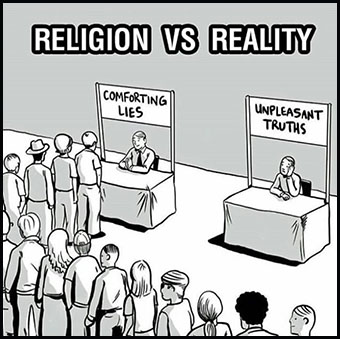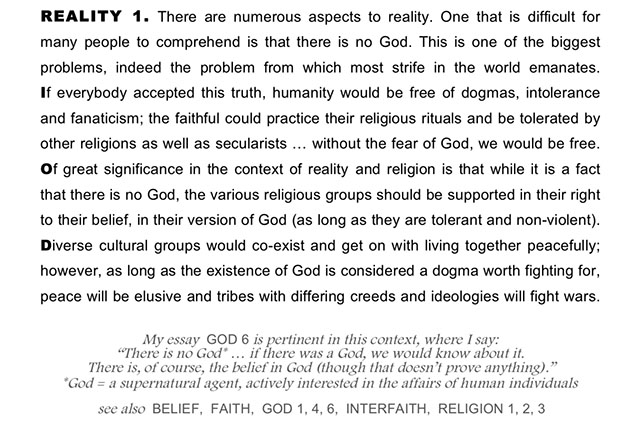958 Belief vs. Reality

From an email exchange
I think the things you say in your book are challenging ...
Oh yes, page VI: "Mission statement: I like to think things through thoroughly; I wish to inspire readers to think about things as they never thought about them before. I trust my writings are thought provoking and a conversation starter" … and I know they are challenging.
… how can you say 'while it is a fact that there is no God ...' no-one knows!
Yeah, this is a big one; ‘it is a fact that there is no God’ is a tendentious notion to rationalise (this is regarding reality and fact ... I shall talk about belief in a minute). But I’ll show that to come to this realization is necessary for a move forward in respect of world peace (see REALITY 1, below). So, what follows below will only appeal to rational thinkers, the thinking-things-through-thoroughly types.
Some philosophers say, “to be an agnostic is a cop-out”. And of course, it is impossible to prove the non-existence of anything (see CELESTIAL TEAPOT) ... so it is a challenging statement.
But the rationalization goes like this: It has been tried a million times to convince atheists that there is a God, and all attempts failed, because there is no proof; but any fact requires proof. So one can say, the likelihood that there is no (factual) God is 99.999999 percent … which may satisfy the agnostic; but in terms of logic and rationalism it can be rounded up to 100 percent.
Anyway, the bottom line is, it is up to the religiously inclined to come up with proof that God exists, it is not up to the atheist to prove His non-existence … and in the absence of proof, it is clear there is no God. The agnostic retort of ‘no-one knows!’ really is specious.
I like to say ‘everybody (who thinks this thing through thoroughly) knows’ that God does not exist; while ‘no-one knows’ if God exists. So, as facts go, it is clear there is no God … but regarding beliefs, anything goes; I tackle this issue many times in my book and my blog, see also 951 On being an atheist.
I’ve heard it said, “I know God exists because I
can see the good He does”. Dear pastor, the good
you see done is due to people’s b e l i e f in God
(and, I may add, so is much of the bad being done);
it is n o t due to an imaginary, interventionist God.
.
see also RELIGION 1
Now, of course this logical rationale has nothing to do with people’s beliefs and their right to believe in anything, including their version of God (see GOD 1). But the dichotomy to reconcile is: Belief vs. Reality (and fact). In a Q & A debate featuring scientist Richard Dawkins vs. the very glib cardinal George Pell (see GOD 6 and my blog 977), Pell obfuscated the distinction with references to how his beliefs are based in historical, pre-Enlightenment - dare I say medieval -definitions of the ‘reality’ of God, proving Pell’s thinking as well and truly stuck in the Dark Ages. ‘Alternative facts’ are a stock-in-trade for religions and were invented long before Donald Trump.
I feel strongly about the issue … for the simple reason that with all organised religions (at least the three Abrahamic ones, especially Christianity) how can the supposition 'there is a God' have any claim to truth, as we’re dealing with a belief system that is built on deceit, lies and falsehoods (nobody was born of a virgin, performed miracles or arose from the dead; see SCRIPTURE). So, for the good of humanity and world peace, atheism is the way (again, see REALITY 1).

But then there is - of course - the notion of, 'always bear in mind the principle of uncertainty' (from page VI of my book, as well as - an important point there - in my 'To Do List for this life'). Your homework is to come to terms with this apparent contradiction (hint: No dogmas).
Cheers, C.
p.s.
in today's newspaper:
"Fewer students identifying a religion fuels push to scrap scripture"
Hallelujah!!! See also UNITY
……………………..
Carsten Burmeister